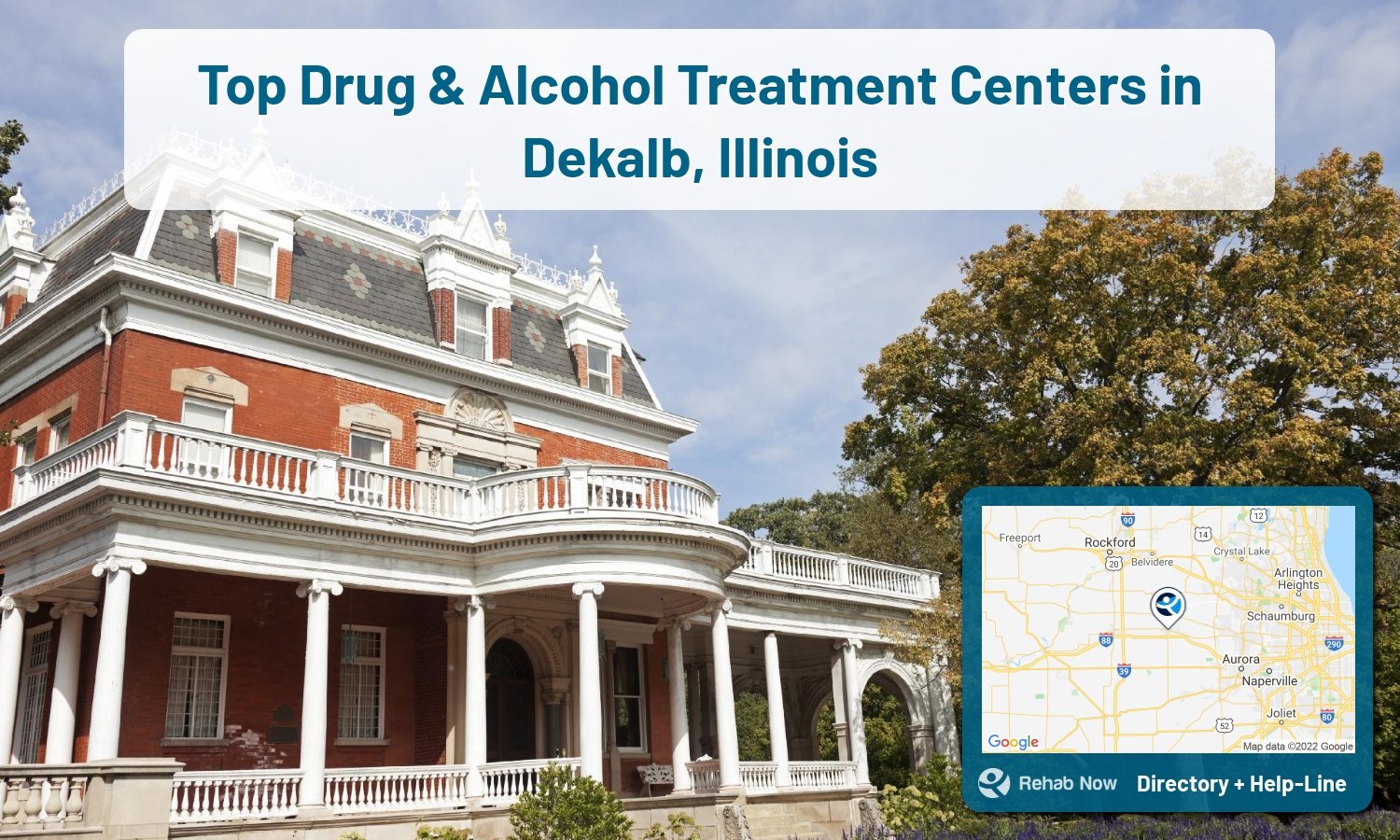Top Drug & Alcohol Treatment Centers in Dekalb, Illinois
Find a treatment facility in Dekalb, IL that suits your particular needs among the many supportive and qualified drug and alcohol rehabilitation facilities. Use the exclusive filter features of RehabNow.org, quickly scan and compare offerings, settings and programs for each facility, or contact our admission counselors for free professional advice and suggestions.
Our list includes a range of accessible services in Dekalb, ready to support you or a loved one lead a safe, secure, alcohol-free and opioid-free future. We list many of the best drug treatment facilities and centers in Dekalb, all with their own unique offerings.
Discover Treatment Options with an Expert
We will help you find treatment based on your location, budget, and specific needs and help you get started safely.
Free + Confidential Consultation
Browse 6 Centers in Dekalb, Illinois
Ben Gordon Center Discovery House provides an array of evidence-based treatments, such as detox, inpatient and residential care, and outpatient therapy, to individuals looking to free themselves from addiction in order to develop the skills needed for sustained sobriety.

KishHealth System at Ben Gordon Center DeKalb Behavioral Health Foundation
KishHealth System at Ben Gordon Center DeKalb Behavioral Health Foundation offers comprehensive mental health services, specializing in addiction treatment, with a holistic approach to help individuals reach recovery and lead healthy lives in Dekalb, Illinois.

Discovery House KishHealth Behavioral Health in DeKalb, Illinois offers psychiatric and behavioral care with comprehensive treatment programs for addiction, mental health, and substance abuse issues, including inpatient and outpatient programs, individualized therapies, and holistic and experiential therapies, overseen by accredited services and licensed professionals.

Northwestern Medicine Ben Gordon Center - Health Services Drive
Northwestern Medicine Ben Gordon Center is a medical center located in Dekalb, IL that specializes in providing comprehensive services and treatments related to mental health, addiction, and substance abuse.

Northwestern Medicine Ben Gordon Center - Community Support Center
The Northwestern Medicine Ben Gordon Center - Community Support Center in Dekalb, Illinois is an accredited addiction treatment facility that offers a range of evidence-based therapies, medication-assisted treatment, and supportive services to individuals suffering from addiction, mental health issues, and substance abuse.

DeKalb Behav Health Foundation Addictions Treatment Services
DeKalb Behavioral Health Foundation Addictions Treatment Services is a state-funded organization in DeKalb, Illinois that provides a range of evidence-based treatments for individuals with substance abuse and mental health issues, including inpatient and outpatient treatments, various therapies and support services, and specialized programs for veterans.

Comprehensive Drug and Alcohol Treatment in Dekalb, IL
Disrupting families and the alcohol or drug-induced relationships is a serious problem in Dekalb, IL. Having a friend or a loved one fighting a struggle with addiction alone is very painful to handle, we’re here for support. There is certainly a lot to love about Illinois, but some areas, even Dekalb, are plagued by opioid abuse and alcohol abuse.
No matter where you live in Illinois, we are confident there is a drug rehab center that can help you overcome your addiction. We can help you find treatment based on your location, budget, and specific needs and help you get started safely.

Additional Treatment Centers in Illinois
In 2016, more than 2,350 Illinoisans died from drug overdoses. More than 5,500 deaths annually occur in Illinois due to the abuse of alcohol and other drugs. 7.17% of Illinois residents reported using illicit drugs in the past month (2018). Substance abuse costs the state approximately $3.5 billion every year.
Still haven't found the right recovery center? Browse nearby Illinois cities.
- Watseka, IL (95.9 mi.)
- Sparta, IL ( mi.)
- Carpentersville, IL (28.7 mi.)
- Island Lake, IL (37.4 mi.)
- Trenton, IL (235.3 mi.)
- Pekin, IL (105.1 mi.)
- Berwyn, IL (49.8 mi.)
- Mount Vernon, IL (250.2 mi.)
- Du Quoin, IL (272.4 mi.)
- Plano, IL (21.8 mi.)
- Carlinville, IL (192.8 mi.)
- Red Bud, IL (265.6 mi.)
- Chicago, IL (443)
- Peoria, IL (38)
- Rockford, IL (38)
- Joliet, IL (35)
- Aurora, IL (30)
- Springfield, IL (29)
- Waukegan, IL (27)
- Elgin, IL (24)
What types of treatment are available in Dekalb, Illinois?
Recovering from any type of substance abuse can be a long process, but it is the most rewarding experience any addicted person will ever go through. After completing the initial detox and withdrawal, you will often be required to engage in a highly comprehensive addiction therapy program. While enrolled in a professional and effective drug rehab in Dekalb, the following are some of the treatment services that you can expect to receive:
Outpatient Programs
Outpatient programs are the standard for addiction treatment. About 9 in 10 U.S. adolescents entering addiction treatment enroll in these programs, so you’re not alone in Dekalb, IL. Treatment is delivered in different settings – offices, clinics, and primary care clinics. These facilities offer a variety of services, such as individual and group counseling and family therapy. During the sessions, you work with a team of experts that include: General physicians, Psychiatrists, Social Workers, and Psychologists.
Drug Detoxification
When patients go through detox, they can experience unpleasant medical and emotional symptoms. Many of them turn to drugs to try and ease this pain. During medically assisted detox, a Illinois healthcare professional is present to make sure the patient doesnÕt go back to using. They will provide medications and other services to ensure the patient remains comfortable.
Opioid Treatment
Addiction to prescription opioid painkillers like oxycodone and hydrocodone, and illicit opioids such as heroin, leads to potentially life-threatening withdrawal symptoms when discontinued. Opioid addiction treatment typically involves an inpatient stay at facilities in Dekalb, IL to make sure they get through withdrawal safely. Treatment also includes comprehensive mental health counseling.
Inpatient Care
Inpatient rehabs are residential treatment programs that receive medical support round the clock to treat severe addictions and co-occurring disorders. Stay length varies from four weeks to six months, depending on individual needs. Inpatient rehabilitation ensures the patient remains in a substance-free environment, improving the success rate of treatment. Treatment begins with medically assisted detox, followed by counseling and behavioral therapy. It usually includes participation in group therapy where peers motivate the individual. Family members are also involved in various ways to provide emotional support.
Rehab is a combination of detoxing the body, rehabilitation, and recovery. There is therapy, aftercare, and support during the entire process. While substance abuse can take over a person’s life, it is something that can also be overcome with help from professionals at Illinois rehabs.
Struggling with addiction in Dekalb, Illinois? RehabNow helps you find the best treatment center or rehab available. (888) 674-0062.
